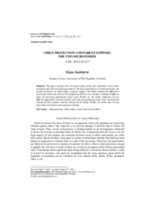Displaying 101 - 110 of 138
The focus of the position is to coordinate and implement projects by Plan International Country Offices and implementing partners, provide technical support for project planning, monitoring and evaluation and offer capacity building assistance for
In new annual report by Ombudsman for Children, Sweden was deemed inadequate in providing support for refugee children.
Sweden begins physical examinations to assess the ages of young asylum seekers.
Daily Mail reports Afghan migrant teen suicides are results of stricter asylum rules.
This article discusses how children’s political agency manifests in everyday life. It shows how children who become aware of their legal status as ‘deportable’ reject this subject position and offer their own definitions of who they are and where they belong. Simultaneously, it is argued that children with varying degrees of knowledge about their legal status also express political agency through their struggle to sustain the inclusion they experience.
After being separated from his parents in a Turkish forest, Mahdi Azizi reunited with his family in Sweden after his father spotted him at an open air concert.
This paper analyzes the concluding sections of assessment reports on applicants for intercountry adoption in Sweden to answer the following question: what must be said about an individual or a couple in order for her/them to be seen as a suitable adoptive parent?
Aiming to support the design of effective intervention strategies, this study examines the hypothesized causal effect of foster children's poor school performance on subsequent psychosocial problems, here conceptualized as economic hardship, illicit drug use, and mental health problems, in young adulthood.
Elisabet Purve-Jorendal was born in India and given away for adoption in 1973 when she was less than six months old. A Swedish couple adopted her when she was two-and-a-half years old. Forty-two years later, she tracked down her biological mother.
This paper examines the two basic models of the state authorities’ intervention into family life aimed at protecting children.

